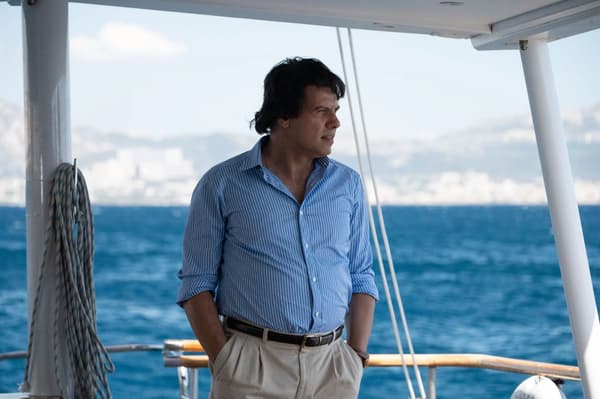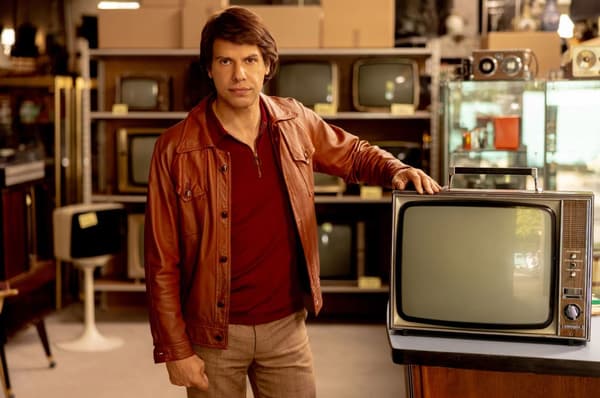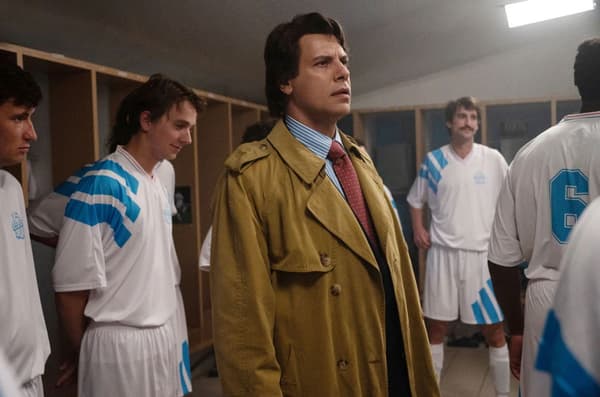The irresistible rise of Bernard Tapie is what Netflix promises to feature with its new miniseries tapieevocation in seven episodes of the life of the famous businessman who died in 2021. Created by Tristan Séguéla (a happy man) and Olivier Demangel (November), explores “the romantic destiny of an extraordinary character” through his successes and failures, according to the streaming platform.
Laurent Lafitte plays the famous businessman of a thousand lives, who was a businessman, city minister but also an actor, singer and owner of the Olympique de Marseille. The actor, who rejected any mimicry, responds to Fabrice LuchiniJoséphine Japy, Camille Chamoux, Patrick D’assumçao, Antoine Reinartz and Hakim Jemili.
“Laurent evokes the image that we have preserved of Bernard Tapie and at the same time it is a recreation,” explains Tristan Séguéla, whom he met at the end of August. “He had a lot of fun because I gave him a lot of freedom.” previously called Wonderful man (the title was changed due to Marvel), the miniseries drew the ire of the Tapie family, shocked by the use of the word “thief” before the promotion.
Opposite during his life
Bernard Tapie himself, during his lifetime, opposed the project. But this is not against the law. “We simply have no right to defame or invade privacy,” explains Tristan Séguéla.
“The series is not bad, it was Tristan Séguéla who made it, he is Jacques’ son [le publicitaire Jacques Séguéla, ndlr] who is a friend of the family,” Bernard Tapie’s son, Laurent, said this Tuesday at RMC.
Without demonizing Bernard Tapie, the series traces his rise to his imprisonment in 1997 in the VA-OM affair, a corruption scandal for which he was imprisoned for almost six months.
Each episode highlights a significant moment from their journey. With the ambition of never glorifying him. At once formidable in business and driven by an almost revolutionary desire to change France and the lives of French people, Tapie de Lafitte often seems like a big, bewildered child whenever he ventures into politics or the legal field. His confrontation with the prosecutor Éric de Montgolfier, whom he tries to convince to cover up the VA-OM affair, demonstrates this well.
Above all, the miniseries explores the businessman’s fascination with fame. A career for fame that made him one of the most prominent French personalities of the last forty years and led him to ruin. Its two creators, director Tristan Séguéla and screenwriter Olivier Demangel, tell BFMTV.com behind the scenes of their event miniseries.
How did this series come about?
Tristán Séguéla: At the beginning, there was a meeting with Laurent Lafitte and this desire for him to be Bernard Tapie on the screen and for me to tell this story in film or on television. We told each other on the set of 16 years or almost (2013), my first film. The first day I told her that she looked a lot like Tapie. Immediately afterwards I spoke about it to Olivier, with whom he was working on a film that was never produced.
Olivier Demangel: I knew his story, but what immediately captivated me was how Tapie invented an almost American life. There is so much romance, twists and adventures in his life that he is dizzying. He asked me how it was possible to have experienced so many things at the same time: the ministry, OM… With this character, there was also the possibility of telling the history of France in the second half of the 20th century. There are not many characters who embody a country as well as he does.

TS: We all grew up with this boy who appeared on television, who fascinated many and discouraged others. In my case, something else was added: I had the opportunity to meet him several times, especially in my childhood. He increased my desire to tell stories in cinema tenfold.
What memories do you have of Bernard Tapie?
TS: He was a jovial person who, unlike other friends of my parents, put everyone on an equal footing, perhaps to crush their world (laughs). Everyone had the right to argue with him. I had a nice disagreement with him! I was between 11 and 12 years old. He scolded me. We talked about football, the Tour de France. Especially sports and later politics. These were his favorite topics.
Was Tapie always conceived as a series?
DO: Very quickly we thought it couldn’t be a movie. Tapie’s story is the history of television. It is the story of a man who sold televisions, who wanted to get into this and who ended up becoming television. Furthermore, not even a 2h15 biographical film left us much space to talk about his multiple lives. Other decisions should have been made. It couldn’t have been this biopic that spans a wide period, with a “rise and fall” [l’histoire de son ascension et de sa chute”, NDLR] as complex as possible.
Why did you decide to focus the series on his desire for fame?
DO: We didn’t want to tell the story of a guy who dreamed of becoming a billionaire so he could buy a yacht and a mansion. What interested us was his relationship with media glory. We show it from the first scene. At the age of 20, a show promised him success in singing. In front of him is Polnareff, who is promised failure! And it’s Polnareff who will become a superstar, not Tapie. We wanted to tell how he recovered from that to obtain media glory.

TS: What television provokes in people, he wants it to be there. The exciting thing is that his thirst for stardom has greatly aided his rise to proportions that not even he anticipated. He created a bubble of fascination around him.
DO: This bubble hit a country that needed role models and heroes to save it from the crisis. That’s why it pleased so many people and then disappointed so much. He embodied the hero who would save people, give them the will to overcome it and go further. There was betrayal with football, but what he embodied was truly of the order of the redeemer.
His promise, in the series, is that he will change France.
TS: There’s a scene in the first episode where Tapie confronts a pastry cart in a bistro. She asks the waiter if she can try them all. She is someone who wants to try everything, who wants to try everything and who believes that he can do everything. And in fact his life shows that he was capable of a lot, but not everything. There were some setbacks.
DO: What people will remember about him, and what they will remember about the series, is his dimension, more romantic than revolutionary. He was not at the end of the revolutions that he himself had started. He was sincere, but he was not at the end of this journey that he wanted to embody. He is like Icarus. He wanted to touch the sun, burned his wings and fell.
The series ends with a Polnareff song. Is this a way to ironize Tapie’s career?
DO: There is humor, but no irony in the series. We never wanted to be above him. We wanted to be beyond good and evil and tell the story of a suburban kid who didn’t have much hope of becoming someone great in life and who did everything he could to achieve it, whether it was positive or negative.
You never present Bernard Tapie as a criminal.
DO: We didn’t want to pass any moral judgment on him. And Tapie is a much more complex figure than that. We wanted to make an intimate portrait of his aspirations and desires. Obviously, he does a lot of things in the show that are terrible, but we didn’t want to dwell on that.
Except during the confrontation between Tapie and the prosecutor Montgolfier…
DO: This scene is loaded with many symbols. Tapie is almost never sitting in the series. He is always on the move. And this is the first time he has to sit down. We liked this obligation to immobilize this character, but also the viewer. It allowed us to confront Tapie with the reality of his choices. evokes Crime and Punishment by Dostoevsky. We reread Raskolnikov’s scene in his judge’s house a lot to construct our scene.
TS: Éric de Montgolfier told a lot about what happened to Tapie. We used some real phrases from the prosecutor like ‘You could have been a meteor and you were just a nebula’ or ‘You were born for the image, you will die for the image’. Which fits perfectly with the portrait we wanted to make of Tapie.
Why did the series end in 1997 after his imprisonment?
DO: It was the natural ending in relation to the portrait we wanted to make of him. Obviously it is a failure for him, but at the same time it is a great success: he has become a legend. He wanted to build his own legend.

TS: In the series, furthermore, everything is 50% true. We didn’t intend to make a Wikipedia-style biopic. Once we enter the realm of fiction, the very idea of truth becomes suspect. The events were not invented, but the way in which they were experienced was.
Each episode begins with a note specifying that Dominique Tapie’s role is fictional…
DO: When writing it, the limitation was inventing this character. We didn’t want to tell the story of the woman behind the man, behind the scenes, but rather for her to interact with him. Make Dominique and Bernard Tapie a couple almost like Bonnie and Clyde.
TS: Biographical elements on which we base ourselves are still known. They did everything together. She was his nominee. When he gets involved in politics, she sees him poorly and that causes a lot of confusion between them. She never hid it and inspired us a lot.
DO: Dominique Tapie, in this series, is clearly a fictional character. We were inspired by some elements because we didn’t want to say anything. We actually don’t know anything about the real character. If it turns out that our character has nothing of the real Dominique.
TS: You will see the series soon. We will know.
Source: BFM TV

